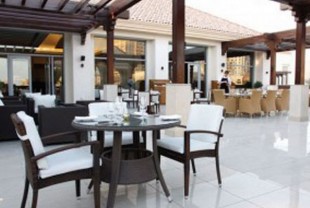

Qatar restaurants' profits slump after alcohol ban

Restaurants and bars on Qatar’s flagship Pearl development have seen revenues slump by more than 50 percent in the wake of a new ruling banning the sale of alcohol to customers.
Outlets on the manmade island off the coast of Doha were told on Dec 12 they could no longer serve booze to guests in what is seen as a display of tension between Qatar’s Muslim culture and its largely expatriate population.
Managers of restaurants located on the popular tourist spot said they had received no explanation for the ban or any indication on whether it might be lifted in the future.
“Every restaurant on the Pearl is banned [from selling alcohol]. We were told around mid-December,” said Sumeet Jhingan, country manager for Foodmark, the hospitality arm of retail giant Landmark Group. “We don’t know if it is indefinite, there was nothing in writing or communicated to us as to how long it is going to last.”
Foodmark, which counts brands such as Carluccio’s, The Meat Company and Mango Tree in its restaurant portfolio, operates two outlets on Pearl-Qatar.
“Obviously the business has dropped; by half… for some restaurants, probably even more,” Jhingan said.
Staff at Maze, the restaurant owned by British celebrity chef Gordon Ramsay that opened on the island in 2010, said business has tumbled in the wake of the alcohol ban.
“I would say [the decline] is even more than 50 percent,” a spokesperson told Arabian Business. “It is not only Maze… all the restaurants have stopped serving. There are a lot of rumours, we are waiting in great anticipation that [the ban will be lifted].”
United Development Company, the developer behind the Pearl-Qatar, declined to comment when contacted by sister publication Arabian Business.
Qatar has shot to fame in recent years, thanks in part to an ambitious investment strategy that saw it snap up trophy assets such as Harrods, and stakes in Barclays, J Sainsbury’s and the London Stock Exchange.
The wealthy Gulf emirate in 2010 won the rights to host the 2022 World Cup, the first Arab country to do so. Doha has pledged to spend some $88bn on infrastructure and hotels over the next decade as it gears up to hold the world’s most-watched sporting event.
But the country’s rapid modernisation has raised fears among the local population that Qatar’s national identity could be diluted by the influx of expatriates and foreign investment.
Qatar Airways, Doha’s flag carrier, is currently the subject of a Twitter campaign that calls, in part, for a ban on serving alcohol on its flights in line with Islamic values.
The sale of alcohol requires a delicate balance with cultural mores and the suspension could be seen as a reminder of these “red lines”, said Chiheb Ben Mahmoud, head of Hotel Advisory, for MENA at Jones Lang LaSalle.
“There was perhaps a perception that grew and spread that the Pearl represents some form of ‘extra territoriality’ when it comes to alcohol and lifestyle. Some sort of ‘free zone’,” he said. “The suspension came to set the record straight.”
Jhingan said Foodmark has suspended plans to open two restaurants and a club on the Pearl-Qatar, home to an estimated 41,000 residents, until the ban on alcohol is clarified.
“Pearl is a destination; it is not a mall. It must be populated so everyone is suffering as without alcohol people do not frequent it as much,” he said. “This not only affects us but also other big names that were coming to the region.”